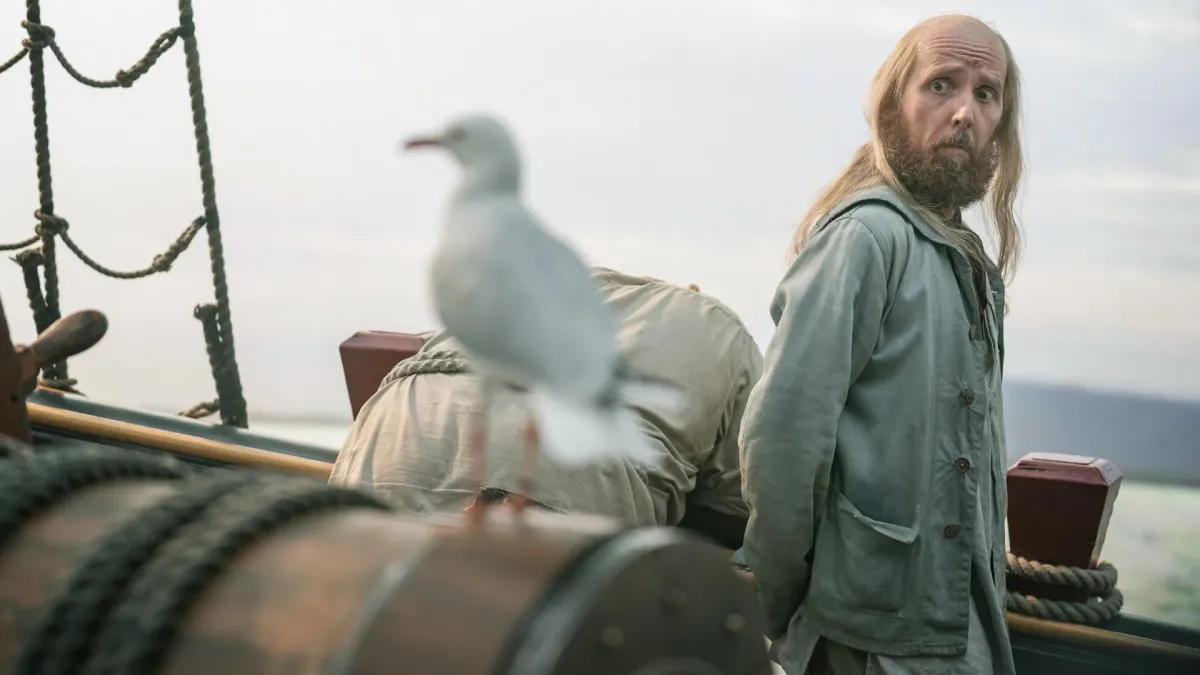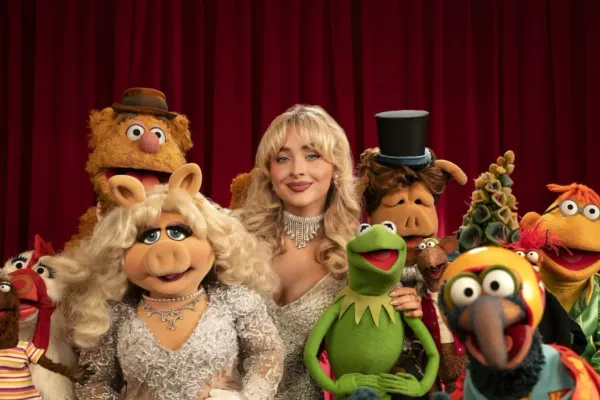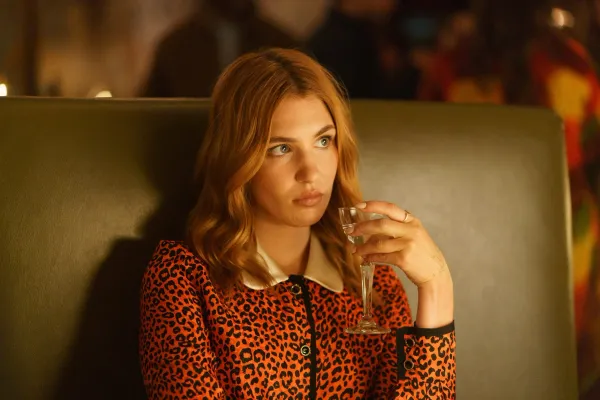Our Flag Means Death: "This Is Happening" and "We Gull Way Back"
In which we write some real-person fiction

(This is the fourth installment of my biweekly recaps of Our Flag Means Death, the HBO Max comedy series that debuted in March 2022 and quickly discovered an adoring fandom. I’ve never seen it! These recaps are only available to paid subscribers.)
- “This Is Happening” (originally aired March 17, 2022)
- “We Gull Way Back” (originally aired March 17, 2022)

I don't know much about sailing, but I do know you probably should do your best not to kill any birds. Albatrosses? Definitely not. Seagulls? That might be the worst idea of all!
So when Calico Jack (a very winning Will Arnett) whipped Karl the seagull to death in "We Gull Way Back," I knew things would take a dark turn. And so they did as the episode reached an ending where the Brits take the Revenge, and all seems lost. Or does it? For Ed swims back to the ship to save Stede and the crew, and the episode ends with Ed and Stede, faces pressed against the ship's deck, smiling blissfully at each other.
Our Flag Means Death is not especially pirate-y for a show set on board a pirate vessel. Like most period pieces, it uses a historical milieu to tell a story about right now. It makes no pretenses of being particularly fidelitous to history, nor should it have to. Yet once or twice in every episode, it's as if the series' producers remember that, right, this show takes place on a pirate ship, and then they work in some bit of pirate-y research or another. Hence, the curse of a dead seagull (also seen in the major motion picture The Lighthouse).
Yet the show is also happy to play into our modern expectations of what a pirate story "should" be. In "This Is Happening," the characters go on a treasure hunt, mainly because that's a thing we expect to happen in pirate stories. Similarly, the stuff that happens in the Republic of Pirates (generally the weakest stuff in the series) feels like it's there because we expect some degree of pirate business per episode. The show's occasional, half-hearted attempts at swordplay also fall into this category. Our Flag Means Death wants to ensure you feel comfortable with its pirate bona fides, even if it doesn't take them too seriously.
The series leans heavily on our expectations of what a pirate story "should" look like because living up to expectations in some areas is a great way to subvert them elsewhere. That's a fancy way of saying that the show is using these tropes to get at the stories it's really interested in, namely the sorts of big-hearted queer romances that it's proved incredibly good at. For instance, that big treasure hunt is just an excuse to get Ed and Stede alone in a situation where Lucius can recognize what's happening between them and call Ed on it.
A few weeks ago, I opined that I rarely ship outside the lines. If a show tells me a couple is meant to be, I'll usually go along with it because I'm nothing if not willing to support the status quo. Yet even by the ridiculously low bar I set for my fiction, I'm all in on the Stede/Ed pairing. These two episodes do such a brilliant job of laying out that the two are into each other and, perhaps more importantly, that they're increasingly aware of that, even if they don't quite know how to tell each other just yet, lacking both the language and the courage.
In that same review a couple of weeks ago, I wondered whether people watching this show back in March thought maybe they were being queerbaited. I heard from a couple of you that, yes, you did worry that, even as the show grew more explicit about some of the other queer flirtations among the supporting cast. Thus, the burden on these two episodes isn't just to let Ed and Stede come to understand they're into each other. It's also to let the audience know that if you've been shipping these two, you haven't been shipping in vain. The show knows what you want, and it wants you to want exactly that.
Creator David Jenkins first hatched the idea when he heard about the historical Stede Bonnet. In his research, Jenkins also learned that Blackbeard took Stede under his wing, something that surely seems curious given the reputation of Blackbeard that has trickled down to us over the years. Either Stede was more bloodthirsty than you'd expect, or Blackbeard was cuddlier than his reputation. And if you're making a modern TV comedy, I know which of the two I would lean toward.
The historical record is a bit more ambiguous regarding how close Stede and Blackbeard were. Generally, the fact that Blackbeard eventually demoted Stede, more or less, is portrayed as a tough break for Stede or an example of how Blackbeard's ruthless ways extended even to people he was friendly with. Our Flag Means Death, however, portrays this historical reality as something of a mentorship, where Stede is only too happy to learn from a more experienced buccaneer. And who knows! Maybe that's what really happened!
Having read up on the actual relationship between Stede and Blackbeard just now, I'm impressed with how closely Our Flag Means Death has hewed to the historical record while also doing its own thing. Were the real Stede and Ed in love? Maybe! Also: Does it matter? Their fictional counterparts are, and there's something a little thrilling about the show taking a historical era that has become synonymous with bloodthirsty brawn and tilting the queer subtext into text.
Broadly speaking, Our Flag Means Death is less a work of historical fiction than a real person fic or RPF. The RPF takes real people, then largely ignores their realities to tell stories using the iconography associated with them that can suit other ends. Perhaps the most famous example in recent years is the musical Hamilton, which mostly sticks to the historical record but also turns the story of America's founding upside down by casting only people of color in every role but that of the English king. Regardless of your opinion on Hamilton (I am a known fan), the show's larger project has basically nothing to do with setting the historical record straight and everything to do with forcing you to consider who tells historical stories and for what purpose.
Our Flag Means Death is playing in similar waters (ha ha). "These two historical personages were totally gay for each other" is an oft-used subgenre of RPF, but OFMD uses that rough idea to completely shift how we think about pirate stories. The idea of lawless reprobates gets turned on its head if you imagine that running away to the high seas might be the only possible way to embrace who you truly were.

In some ways, any RPF about a historical person is an act of queerness. The simple fact of queerness is that much of its history is written in the margins of other history. Queer people have always existed, and if you go digging for mentions of us, you'll find us in every single era, in every single place. The assumptions we place on historical personages that they were exactly who the history books say they were are simply that — assumptions. And while Our Flag Means Death doesn't mean to adhere to any sort of historical record, by its very existence, it complicates the way we think about everything we know.
Our Flag Means Death is only incidentally a show about pirates, but the simple fact of its milieu ends up being more subversive than it should seem. After all, what tragedy follows the death of Karl? The (brief) departure of a would-be lover and the arrival of the authority these would-be reprobates took to the seas to escape. The people who write the history books paint a picture with little room for anything other than an official narrative. The simple act of telling a story that is only marginally true is its own act of radicalism because it takes what was always in the margins and insists it is just as worthy of consideration as what was written on the page.
Other thoughts I thought:
- By far the worst thing this show has been responsible for so far is the episode title "We Gull Way Back." Please make it stop.
- I praised the music supervision the last time around, and I was pleased to see that the series used the oft-overused Fleetwood Mac track "The Chain" brilliantly in the climax of "Gull." It's one of the greatest songs ever written, and its propulsive nature leads so many movies and shows to use it. That this series pulled it off and did so so memorably is a minor miracle.
- I like Jim as a character, but I really wish that whole corner of the show hadn't gotten swallowed up by the Siete Gallos stuff. It's just a bit numbing, and it often feels like it exists solely to get some SNL alums into the proceedings.
- I was surprised by how affected I was by the death of Karl. Yes, he was just a seagull, but he was our seagull.
- I laughed at the Swede having scurvy a few more times than I probably should have. I have a weakness for the comedic loss of teeth, I guess.
- I don't always love when dead characters have identical twins, but I do when they're played by Rory Kinnear, who is evidently auditioning for his role in Men.
- Seriously, that final shot of "We Gull Way Back" is just TV romance perfection. Imagine me kissing my fingertips.

On Oct. 17: Is that really it? When next we meet, it will be for the final time, as I cover "Act of Grace" and "Wherever You Go, There You Are," the season's final two episodes.




